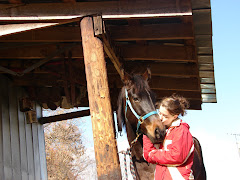I usually hate the articles we have to read. But I loved this one! I liked the content and the way she told a story throughout most of it. I think I actually took away a much better understanding of why people act the way they act. It’s a multitude of reasons wrapped up; could be culture, background, parents, past experiences. And you just have to take each student for who they are.
For instance, the other children would communicate for Alma. She would shut down and not respond to Paley, an adult. She seemed just like a scared animal. When you go up to them they freeze, “play dead” in a sense. I worked in a daycare and this is very typical for a child who has never been in schooling especially when they are put in at an older age, 5. It seems that they are intimidated by everyone but latch onto the children first because their more alike, which is completely understandable. And after the part were Paley tried to talk too little Alma’s mother it was obvious to see that Alma was much like her mother. She seemed shy, and intimidated by others as well.
“You look as chocolate pudding” one student says then she goes on to say “you never say anything like that to black people.” Things like this just don’t make sense to me because no we don’t say stuff like that but it is acceptable to go up to a white little girl and say “you are just pasty white darling” or “you look like you need a little sun” and that is acceptable. I have had things like this said to me by blacks and whites and it doesn’t bother me any. I think people are just afraid of anything different, so to many people things that are and aren’t acceptable can change in situations that are unknown.
Also I think children, especially that young say exactly what their thinking. If they see a black person and they describe them as “chocolate pudding”; well, they could be the color of chocolate pudding. Or when they say “why do all blacks look poor?” These are times that children really might think what they say, it is our job to broaden their horizons and show them that all people can be poor and all people can be rich. Everyone focuses on instances like this. But I have seen even more little over weight children or even adults being described. I remember when my little sister, she couldn’t have been more than 3, said “momma Aunt Kelly is fat!” right in front of my aunt whom she was talking about. My aunt quickly said back “well, she’s right.” Children are just inquisitive, most of the time they don’t know that their being rude, or ugly. They are just curious. That is what schooling is for, to allow people to experience new situations and ideas; it’s all a learning process. As they grow and come across instances like this, I believe it is our job to point out that things like this are rude, and can hurt people’s feelings. If all little kids didn’t do this, then there wouldn’t be a whole objective on feelings in the state standards. It something that children have always done and will always do. I think it is how long the child is allowed to do things like this that can make them appear rude, and obnoxious. They need to learn at an early age lessons like this, so that they can be more successful in life. When people are uneducated I believe that is when they become naive.
Monday, March 31, 2008
Monday, March 24, 2008
hidden culture of power
I think schooling is important to everyone! No matter race, gender, economic status, or age; a student’s schooling should come first. I don’t think students today understand the seriousness of what schooling does for them. I like Delpit’s comment in the silenced dialogue “if schooling prepares people for jobs, and the kind of job a person has determines her and his economic status and, therefore, power, then schooling is intimately related to the power.” The power delpit speaks of is what, I believe, everyone is striving for in the long career run. It can be different for each person. The power can be the money one makes, the title they hold, the position they fulfill, or the home life they have because of their job. For each person the power is different. The power I hope to achieve after school is the power to have a home life I can be proud of because of my job. The power that school gives people comes in a “culture code” including linguistic forms, communication strategies, and presentation of self; that is way of talking, ways of writing, ways of dressing, and ways of interacting. All of these skills are tough in the classroom. In my classroom I hope I can make these codes clear for my students so that they are able to follow it through their schooling. Whether it is direct teaching go reading and writing or indirect role model type teaching presenting myself in a professional manner by the way I interact with everyone and my appearance.
Wednesday, March 19, 2008
racism in school
“It is obvious that when we talk about race in the U.S it has nothing to do with the biology of skin pigment, but it has everything to do with how we see and act in the world based on the historical construction and social implications of that it means to be associated with a certain color.” This quote comes from Pepi Leistyna in the article “Racenicity.” I like this because it doesn’t actually matter if someone is Hispanic, white, African America, or Indian as a color. It’s how they act and were represented in history, if history were mixed up and different races were involved in totally different things our prejudices would be different. I think that in the long run racism is still in the world today, but I feel it is because people are living in the past; “reflecting history.” I hope in my classroom I can see everyone for who they are rather than what they look like or what background they come from. And I mostly hope that my students will have this same sort of attitude on other people as well.
I liked the article on “beware the standards” by alfie kohn. Specifically the section titled how quantifiable. He states that people are so caught up in standardized testing and easily measurable testing that teachers loose their ambition to teach. They are veering away form thoughts and ideas and focusing on grammar. “Measurable outcomes may be the least significant result of learning” Kohn mentions that this quote by Linda McNeil should be in 36 bold font on all the walls. I like this quote because its true. Out in the real world most employees are not looked down upon because they don’t use a comma correctly but how they accomplish the task at hand. Although I do think things like this can be measured. Although it has much more potential for bias physical efforts, thoughts and ideas can be measured and graded. Yet the outcome of grade may be different for each person that grades it, it indeed can be measured. And I enjoy this type of teaching and learning, the kinds of ideas rather than facts. This is how communities grow and learn new things, through new ideas!
I liked the article on “beware the standards” by alfie kohn. Specifically the section titled how quantifiable. He states that people are so caught up in standardized testing and easily measurable testing that teachers loose their ambition to teach. They are veering away form thoughts and ideas and focusing on grammar. “Measurable outcomes may be the least significant result of learning” Kohn mentions that this quote by Linda McNeil should be in 36 bold font on all the walls. I like this quote because its true. Out in the real world most employees are not looked down upon because they don’t use a comma correctly but how they accomplish the task at hand. Although I do think things like this can be measured. Although it has much more potential for bias physical efforts, thoughts and ideas can be measured and graded. Yet the outcome of grade may be different for each person that grades it, it indeed can be measured. And I enjoy this type of teaching and learning, the kinds of ideas rather than facts. This is how communities grow and learn new things, through new ideas!
Subscribe to:
Posts (Atom)


